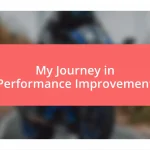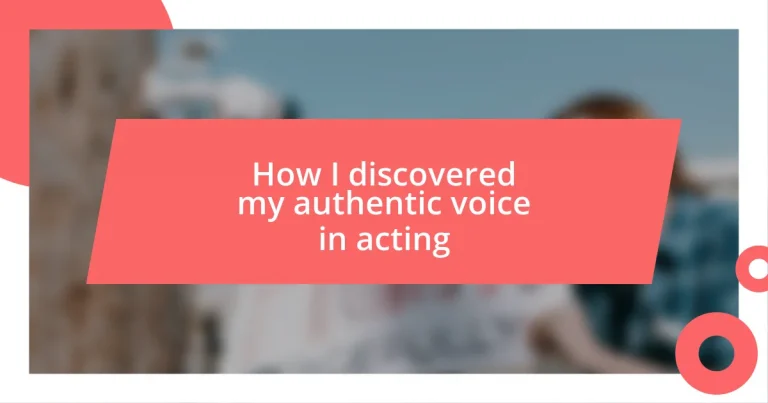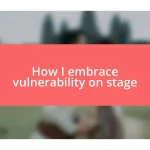Key takeaways:
- Authenticity in acting emerges from self-awareness and embracing personal vulnerabilities, allowing deeper connections with the audience.
- Exploring various acting techniques enhances the actor’s craft, revealing unique aspects of their voice and encouraging individuality in performances.
- Integrating feedback and practicing self-reflection are essential for growth, helping actors refine their skills and deepen their connection to characters.
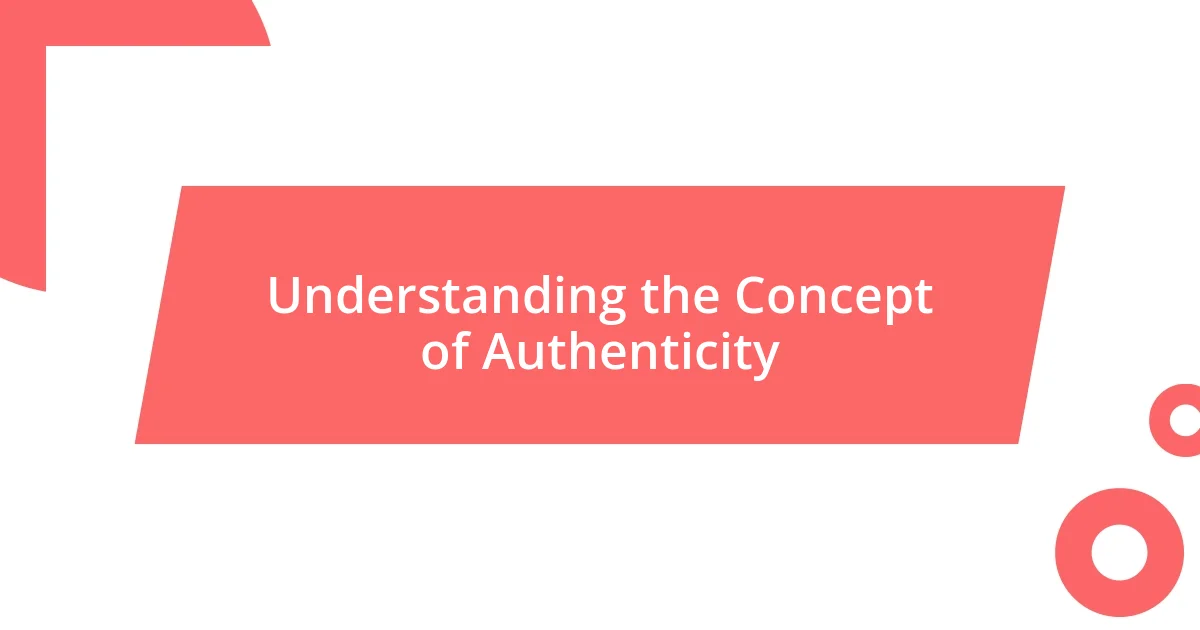
Understanding the Concept of Authenticity
Authenticity in acting is deeply rooted in self-awareness and vulnerability. I remember a specific rehearsal where I broke down in tears—completely unplanned, but that moment of emotional honesty revealed more about my character than any line could. Isn’t it fascinating how a single moment of truth can resonate with an audience far more than curated performances?
When I think about authenticity, I often reflect on the myriad of personal experiences we all carry. Each of us has layers of joy, sorrow, and everything in between that shape our responses. Isn’t it interesting how tapping into these genuine emotions can elevate our performances and connect us with our audience on a profound level?
In my early days, I struggled with the idea that I needed to mold myself into an ideal actor. I often felt like a chameleon, constantly shifting my colors to fit what others expected. But embracing my quirks and vulnerabilities was transformative. Have you ever felt like you were wearing a mask? I realized that the more I shed those layers, the more I could embrace my true voice on stage.
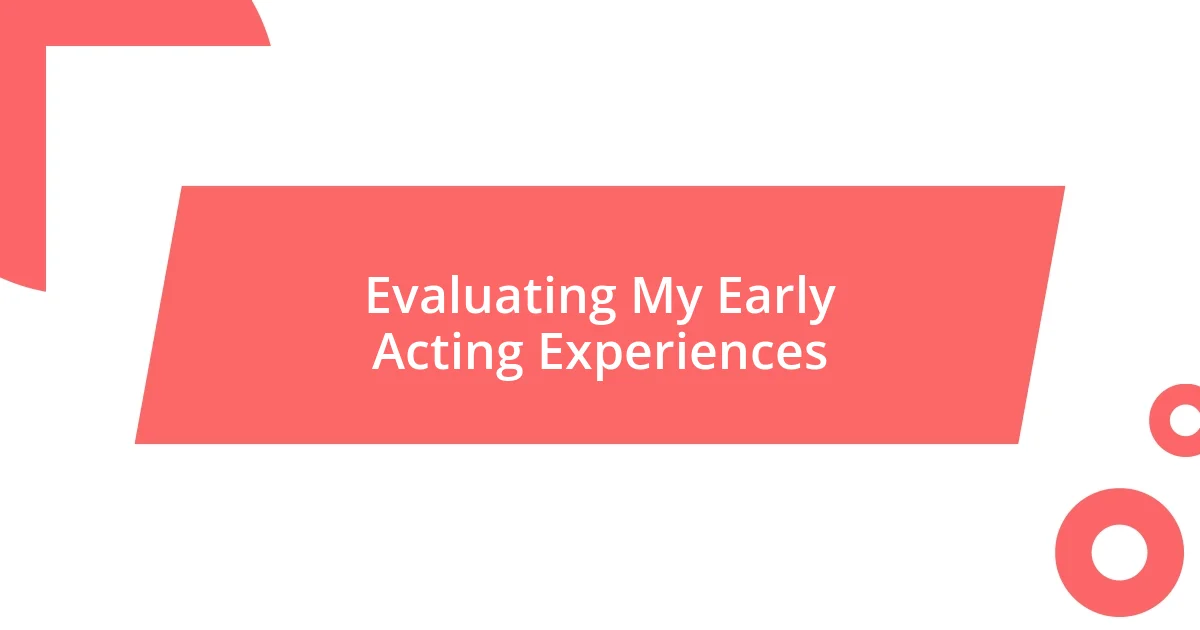
Evaluating My Early Acting Experiences
Evaluating my early acting experiences is like looking back at a personal scrapbook filled with lessons and realizations. During my first acting class, I was surprisingly shy, clinging to the script as if it were a life raft. I recall one exercise where we had to improvise a scene without any preparation—my heart raced, and I stumbled over my words. But that moment became a turning point; it pushed me to embrace spontaneity and instinct over mere memorization.
Another formative experience was during a school play. I played a character who was incredibly different from me—a bold, outspoken individual. At first, I felt like an actor in a costume, not truly embodying that role. Yet, as I delved deeper into the character’s motivations, I began to uncover hidden aspects of myself. The blend of my vulnerabilities with the character’s boldness helped me realize that acting isn’t merely about portraying someone else; it’s also about amplifying parts of ourselves we often keep tucked away.
Reflecting on those early days, I recognize that each uneven performance taught me resilience. There was a time when I forgot my lines completely on stage, leaving me standing in awkward silence. In that moment, I learned that mistakes are part of the journey. I found that some of my most authentic moments came not from perfection, but from embracing imperfection.
| Experience | Insights |
|---|---|
| Improvisation Class | Embracing spontaneity builds confidence. |
| School Play | Understanding characters reveals hidden parts of ourselves. |
| Forgotten Lines on Stage | Embracing mistakes enhances authenticity. |
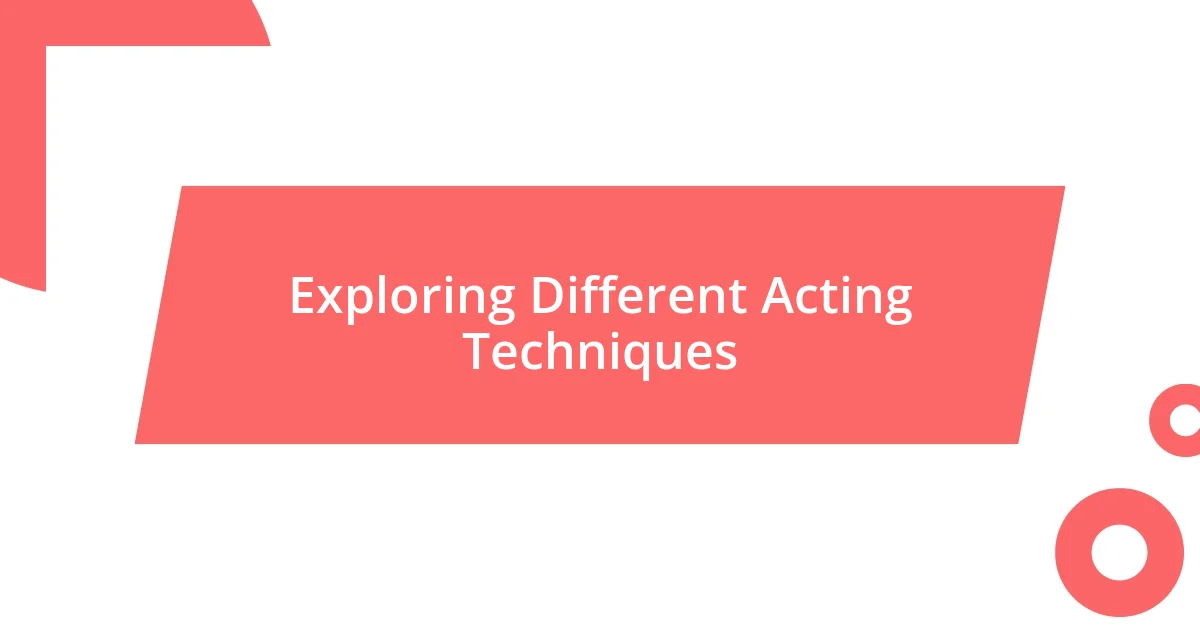
Exploring Different Acting Techniques
When I first ventured into acting, I was surprised by the variety of techniques available. Each method, from Stanislavski’s emphasis on emotional memory to Meisner’s focus on repetitive behavior, opened new avenues for self-exploration. I vividly recall an experimental workshop where we tried different techniques weekly. One week, we immersed ourselves in the physicality of the characters, exploring how body language shapes emotion. That experience taught me that there’s no “one size fits all” in acting; instead, it’s about finding what resonates with your authentic self.
Here’s a quick glance at some popular acting techniques:
- Stanislavski Method: Focuses on emotional memory and the actor’s personal experiences.
- Meisner Technique: Emphasizes living truthfully under imaginary circumstances, relying heavily on improvisation.
- Lee Strasberg: Centers on emotional recall, fostering deep personal involvement with the character.
- Michael Chekhov: Encourages a more imaginative and physical approach, using movement and gestures to connect with the character.
- Uta Hagen: Focuses on understanding and finding a personal connection to the character’s circumstances.
Exploring these techniques allowed me to discover aspects of my craftsmanship I never knew existed. I’ll never forget the exhilarating feeling of stepping into a character’s shoes using Meisner’s method; it pushed me beyond my boundaries and connected me to my scene partner in a way I hadn’t experienced before. Each technique was like trying on a new outfit—some fit perfectly while others felt a bit off. That exploration ultimately led me to my unique voice.
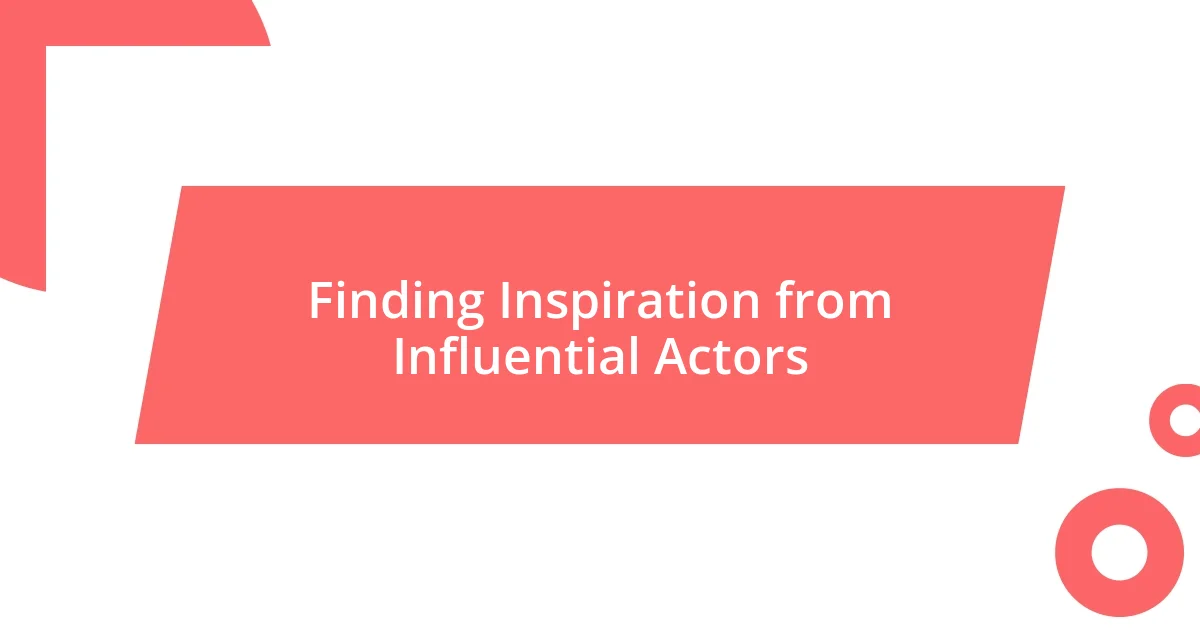
Finding Inspiration from Influential Actors
Finding inspiration from influential actors has been one of the key elements in my journey to discovering my authentic voice. I remember watching Meryl Streep in “The Iron Lady” and being mesmerized by the way she transformed into the character. It sparked a realization within me: acting is not just about delivering lines. It’s about capturing the essence of a person and making that experience relatable to the audience. Did I ever consider that acting could be that profound? Absolutely, and it fueled my determination to learn from the best.
I also found inspiration in Denzel Washington’s performances. His ability to convey deep emotions simply by using his eyes often left me in awe. One night, I attended a workshop where the facilitator asked us to focus on just our gaze while performing a monologue. It felt uncomfortable at first, but as I let go of my inhibitions, I could feel a whole new layer of connection to my character emerging. In those moments, I began to question how much emotion I could convey without saying a word—could I connect with the audience on a deeper level? The answer was a resounding yes.
Moreover, watching Viola Davis embrace her characters with such raw honesty inspired me to dig deeper into my emotional reservoir. I recall a scene where she spoke about her struggles, making every listener feel her pain. I realized that vulnerability is a powerful tool in acting. Are we willing to expose our own vulnerabilities? For me, embracing that openness transformed my performances. It was no longer about pretending; it was about sharing real parts of myself through the lens of the characters I portrayed. This realization has been priceless in distinctively shaping my voice.
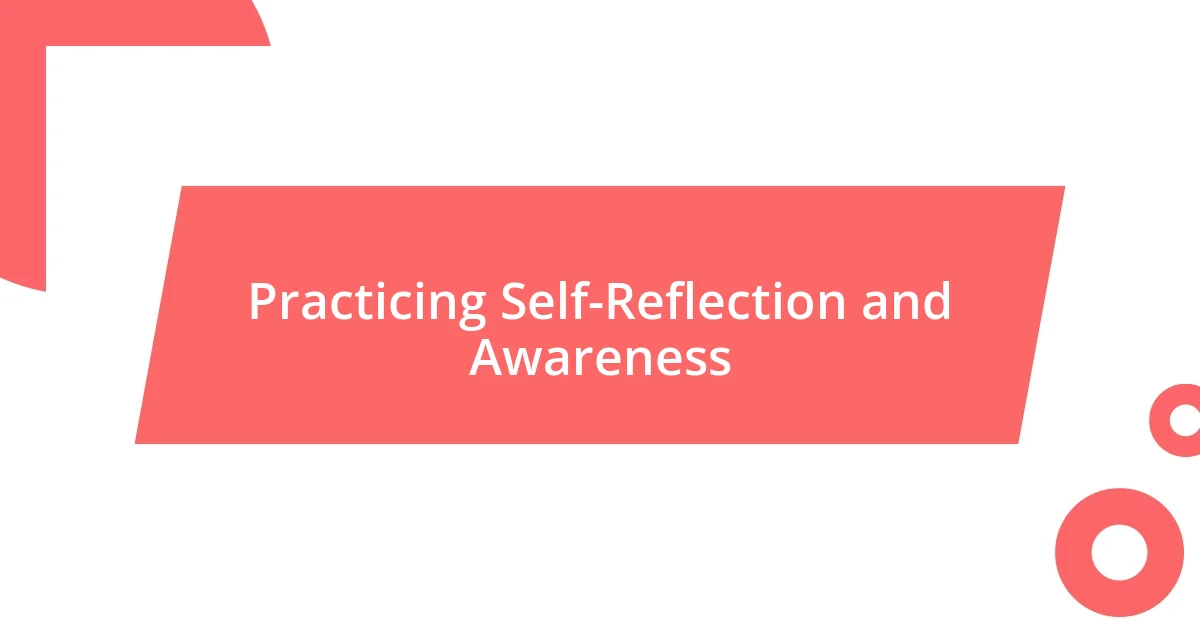
Practicing Self-Reflection and Awareness
Practicing self-reflection and awareness has been a transformative aspect of my acting journey. I remember sitting alone after a rehearsal, a journal in hand, pouring my thoughts onto the pages. I often asked myself, “What did I feel during that scene?” This type of introspection allowed me to understand my emotional triggers and the reactions I exhibited on stage, leading to a deeper connection with my characters.
There was a time when I struggled to understand why I felt disconnected during certain performances. I found myself asking critical questions: “Am I truly welcoming my character’s journey?” or “What fears or insecurities are holding me back?” By embracing self-awareness, I began to unravel my emotional barriers. It was empowering to confront my vulnerability, transforming it into a source of strength that I could infuse into my acting.
During a particularly challenging rehearsal, I realized the importance of being present and mindful in the moment. As I focused on my breath and visualized the emotions tied to my character, I felt an undeniable shift. I could see those moments as a reflection of my truth, molding my authentic voice more profoundly. Isn’t it fascinating how self-reflection not only enhances our skills but also harmonizes our personal truth with our performances? This continuous dialogue with myself has been pivotal in shaping who I am as an actor.
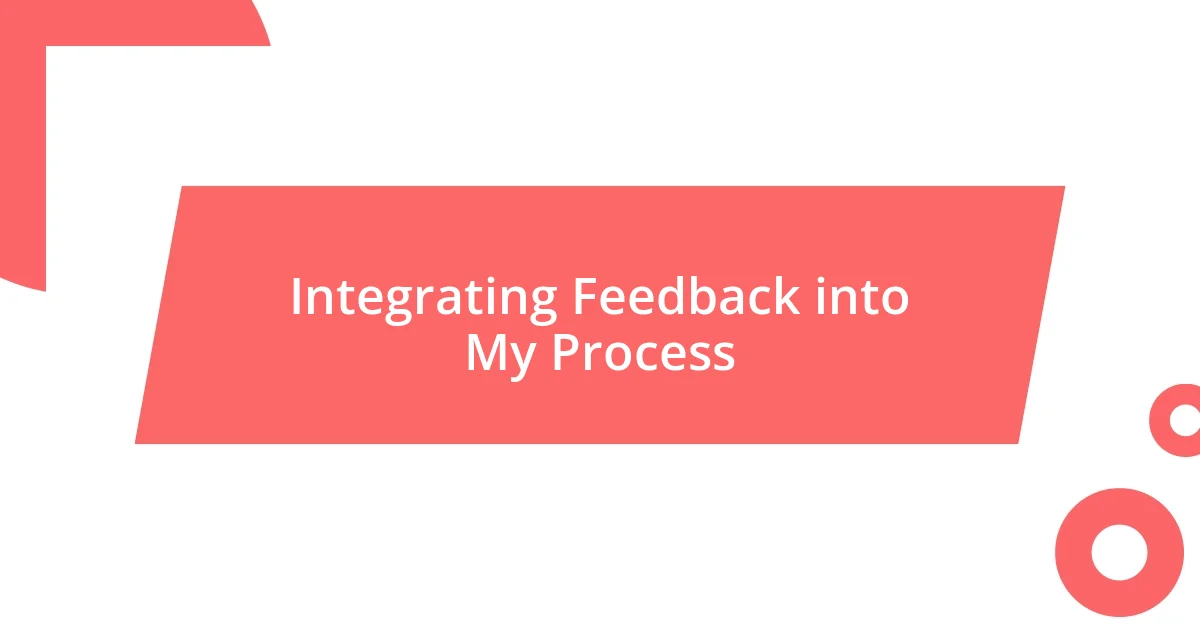
Integrating Feedback into My Process
Integrating feedback into my process has become a cornerstone of my growth as an actor. I remember the first time I received critical notes after a performance; it stung a little, but I quickly learned to see it as a gift. Instead of brushing it off, I decided to dive into those insights, curious about how they could enhance my craft. Could the perspectives of others really help me grow? Absolutely. Each piece of feedback offered a new lens, illuminating aspects of my performance I hadn’t noticed before.
I’ve also developed a ritual of recording my rehearsals and watching them later. The first time I did this, I felt vulnerable, almost exposed. How could I be so unaware of my own tendencies? But as I watched, I picked up on subtle habits and nuances that I could adjust. This practice taught me that self-critique, paired with external feedback, can transform what feels instinctive into something more refined and intentional. I found myself asking, “What would my mentor say here?” Their voices echo in my mind even now as I evaluate my performances.
Embracing feedback isn’t just about improving skills; it’s about fostering a dialogue with the characters I portray. For me, the questions I receive from directors and peers serve as catalysts for deeper exploration. When someone challenges me to step out of my comfort zone, I can feel the butterflies in my stomach—yet I also sense the excitement of growth. Have I ever feared the unknown in those moments? Sure, but I’ve also discovered that the essence of my authentic voice thrives in that very vulnerability. Integrating feedback has taught me that every note is an invitation to dig deeper into my artistry.



